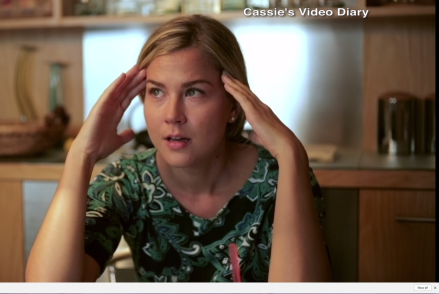
“I don’t know where I’m headed with what I believe, and what is right and what is wrong, and who is wrong and who is right and… […] that’s why I’m feeling frustrated, I don’t know where the truth is.”
Cassie Jaye’s propaganda film for a Voice for Men is a poorly managed and directed movie about Jaye abandoning her feminist beliefs and becoming a men’s rights activist. Jaye is notably deceptive in her depictions of both the MRAs she interviews (most notably Paul Elam), and in her interviews with academic feminists and feminist activists. Unfortunately, Jaye is so inept at her job that her efforts to spiff up A Voice for Men into respectability instead make her look like a dope for their agenda.
Jaye seems dreadfully incurious about the subject of her own film. Hateful, violent utterances and writings by Paul Elam are shown in the introduction, but Jaye never asks Elam about them during their lengthy interviews. The interviews lack direction – Jaye rarely asks questions or challenges her interviewees, even when it’s warranted. For example, Elam spends the latter part of his appearances in The Red Pill grandstanding about the father’s rights and the injustice of family court. Jaye either doesn’t know or doesn’t wish to address that Elam is, according to court records, a deadbeat dad who renounced his own parental rights to his daughter when she was a baby. Addressing these inconsistencies between the MRM’s ideals and its actions would have made a stronger film, but perhaps not one with the conclusion Jaye needed to arrive upon.
This is not to say the MRM’s grievances are wholly without merit. Their issues are real, but they mistakenly blame women and feminism for causing them, failing to recognize how a patriarchal system of control can harm men and women in the service of a privileged few. Rather than examine the political system which sent millions of young men to fight WWI, MRAs focus on The Order of the White Feather, a group of British suffragettes who shamed non-enlisted men by giving them white feathers. Rather than contemplate how sexual objectification of women makes them miserable, MRAs blame women for not being better sex objects. But Jaye’s documentary doesn’t engage with any specific MRA idea long enough for its flaws and inconsistencies to become apparent. Warren Farrell’s book “The Myth of Male Power” states that sexually desirable women have a kind of “miniskirt power” over men, which he illustrated on the cover of the 21st anniversary edition with a shapely stock-photo derrierre smashing the word “power”. Unsurprisingly, Jaye’s interview with Warren films older copies of the book, without the butt cover art.
This documentary also suffers because of its subjects. Jaye interviewed Karen Straughan, who, like she did in her interview for The Sarkeesian Effect, drank alcohol during filming. This has the effect of making Straughan’s face very red and of absolutely destroying any professional credibility she might have brought to bear. Even if you didn’t know Straughan makes most of her money through donations from other MRAs for her Honey Badger Radio broadcasts, you’d still have the impression that she’s just bitching about feminism in a noisy bar.
“The Red Pill” also has its moments. At one point Jaye screens this rotating snowflake graph, which visually depicts the MRM’s contradictory demands on women and upon which some of the text is always upside-down. Judging by the labels, what MRAs really seem to want is control – the right to make a woman abort a pregnancy or carry it to term, to initiate divorce but not have a divorce initiated against them, to choose whether or not they’ll pay child support. Another frame shows a blizzard of MRA insecurities and grievances, each snowflake labeled “failure to launch”, “restraining orders”, “paternity fraud”, and so on.
Choices in Jaye’s cinematography reinforce my impression that this is a propaganda film. The score is a bit obvious in places, and towards the end there’s a bit that sounds like ASMR of Dean Esmay’s voice. Jaye’s interviews with Paul Elam frame her as submissive and barefoot, kneeling on one side of the sectional like Alice in Wonderland before the Caterpillar. Framing like this, combined with the “Video Diary” confessionals places Jaye at the center of her own film, increasing its appeal to the MRM but making it a weaker documentary overall. By the time Jaye has gotten into interviews with academic feminists, her mind appears to be made up. Sometimes, she rolls her eyes at the camera while the academic goes on with their general spiel, as if to object to what they just said. But Jaye never asks anyone a tough question in this movie.
It’s worth noting The Red Pill was saved from post-production hell. After two years of delays, Jaye raised nearly $200,000 on a Kickstarter with help from Milo Yiannopoulos, Mike Cernovich, A Voice for Men, and all their fans on Reddit. That money seemed like it was going to fund a propaganda film, and that appears to be the product Jaye delivered. Sadly, the guys in AVfM didn’t stick together long enough for the film to do them much good. Dean Esmay, Paul Elam, and a bunch of other subjects quit Men’s Rights Activism before this movie’s premiere. This too goes unaddressed in “The Red Pill”.
You must be logged in to post a comment.